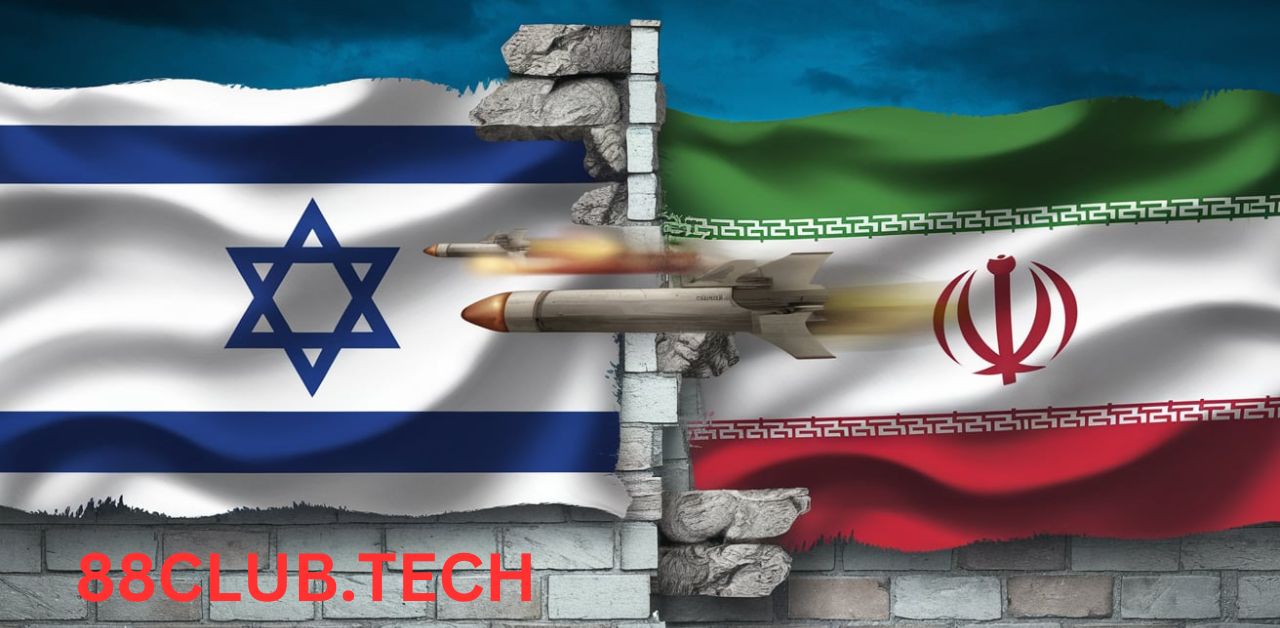In the wake of Iran’s recent missile attacks on Israel, the world watches with bated breath, wondering: how might Israel respond to Iran’s missile attacks? This unprecedented escalation has thrust the Middle East into a precarious situation, with far-reaching consequences that could reshape regional dynamics and global geopolitics.
The Spark That Ignited the Powder Keg

Iran’s bold move to launch a barrage of missiles at Israel marks a significant turning point in the long-standing tensions between these two nations. To understand the gravity of the situation and potential Israeli responses, we must first examine the events that led to this critical juncture.
Timeline of Recent Hostilities
- April 1, 2024: Israeli airstrike on Iranian consulate in Damascus
- April 13, 2024: Iran launches over 300 drones and missiles at Israel
- April 14, 2024: Israel intercepts majority of Iranian projectiles
This rapid escalation leaves many wondering how might Israel respond to Iran’s missile attacks, given the complex web of alliances and conflicts in the region.
Israel’s Military Options: A Delicate Balance

As Israel contemplates its next move, several military options are on the table. Each carries its own risks and potential for further escalation.
Targeted Strikes on Iranian Nuclear Facilities
One potential response could involve precision strikes on Iran’s nuclear infrastructure. Key targets might include:
- Natanz uranium enrichment complex
- Isfahan Nuclear Technology Centre
- Fordow Fuel Enrichment Plant
How might Israel respond to Iran’s missile attacks by targeting these facilities? Such action could significantly set back Iran’s nuclear program but also risk international condemnation and potential retaliation.
Attacks on Iranian Military Bases and Missile Launch Sites

Israel might opt for a more direct approach, targeting the sources of the recent attacks. Potential targets include:
- IRGC bases
- Missile storage facilities
- Command and control centers
This strategy could diminish Iran’s ability to launch future attacks but may lead to a wider conflict.
Cyber Warfare and Covert Operations
Israel’s renowned cyber capabilities could play a crucial role in its response. Potential actions include:
- Disrupting Iranian infrastructure
- Sabotaging military communications
- Launching disinformation campaigns
These less overt methods might allow Israel to respond without triggering a full-scale war, but their effectiveness may be limited in satisfying public demand for action.
Maritime Confrontations in the Persian Gulf
The question of how might Israel respond to Iran’s missile attacks could extend to naval operations. Potential actions include:
- Disrupting Iranian oil exports
- Targeting IRGC naval bases
- Securing strategic waterways
Such moves could impact global oil markets and draw in other regional powers.
Diplomatic and Economic Responses: Leveraging International Support
Israel’s response isn’t limited to military action. Diplomatic and economic measures could play a crucial role in addressing the situation.
Lobbying for Increased International Sanctions
Israel may push for stricter sanctions against Iran, targeting:
- Iranian oil exports
- Financial institutions
- Key individuals in the Iranian regime
This approach could pressure Iran without direct military confrontation but may take time to show results.
Strengthening Alliances with Arab States and Western Powers
Recent normalization agreements with Arab nations could prove valuable. Israel might seek to:
- Enhance intelligence sharing
- Coordinate regional defense strategies
- Establish a united front against Iranian aggression
These alliances could significantly alter the balance of power in the Middle East.
Leveraging US Support
The United States remains a crucial ally for Israel. Potential areas of cooperation include:
- Enhanced missile defense systems
- Joint military exercises
- Diplomatic backing in international forums
As we consider how might Israel respond to Iran’s missile attacks, US support will likely play a pivotal role in shaping Israel’s options and their potential consequences.
Internal Israeli Considerations: Balancing Public Pressure and Strategic Restraint
Israel’s response will be influenced by domestic factors as much as international ones.
Public Pressure for a Strong Response
Recent polls show:
| Support for Military Action | Percentage |
|---|---|
| Strong support | 62% |
| Moderate support | 23% |
| Opposition | 15% |
This public sentiment could push the government towards a more aggressive stance.
Military Readiness and Defense Systems

Israel’s advanced defense capabilities, including the Iron Dome system, successfully intercepted most of Iran’s missiles. This success might influence the calculus of how might Israel respond to Iran’s missile attacks, potentially allowing for a more measured approach.
Economic Impact of Prolonged Conflict
A protracted conflict could have severe economic consequences:
- Disruption to trade routes
- Decreased tourism
- Increased defense spending
These factors may temper calls for an all-out war, pushing Israel towards a more strategic response.
Regional Implications: A Delicate Balance of Power
Israel’s response will have far-reaching effects across the Middle East.
Potential Involvement of Hezbollah and Other Iranian Proxies
How might Israel respond to Iran’s missile attacks if Hezbollah enters the fray? This Lebanese militant group, backed by Iran, poses a significant threat to Israel’s northern border. Any Israeli action against Iran could trigger Hezbollah involvement, potentially opening a second front in the conflict.
Impact on Israel-Palestine Peace Process
The recent escalation threatens to derail any progress in Israeli-Palestinian relations. A major conflict with Iran could:
- Increase tensions in the West Bank and Gaza
- Complicate negotiations with Palestinian authorities
- Shift international focus away from the peace process
Effects on Regional Stability and Oil Markets
The Middle East’s role as a global oil supplier means any conflict could have significant economic repercussions:
- Potential disruptions to oil production and transportation
- Spike in global oil prices
- Economic instability in oil-dependent nations
As Israel contemplates how might Israel respond to Iran’s missile attacks, these broader regional implications will undoubtedly factor into their decision-making process.
Global Consequences: A World Watching and Waiting
The international community’s response to this crisis will play a crucial role in shaping its outcome.
US Involvement and NATO Responses
The United States, as Israel’s closest ally, faces a delicate balancing act. Potential US actions include:
- Providing intelligence and military support to Israel
- Deploying additional forces to the region
- Engaging in diplomatic efforts to de-escalate the situation
NATO’s response could range from issuing strong condemnations to considering more active involvement if the conflict threatens to spill beyond the Middle East.
UN Security Council Deliberations

The UN Security Council has called an emergency session to address the crisis. Key points of discussion will likely include:
- Calls for immediate de-escalation
- Potential sanctions against Iran
- Measures to prevent further missile attacks
The council’s ability to reach a consensus could significantly influence how might Israel respond to Iran’s missile attacks.
Russia and China’s Potential Mediating Roles
Both Russia and China have significant interests in the region and could play crucial mediating roles:
- Russia’s military presence in Syria gives it leverage with both Iran and Israel
- China’s economic ties to Iran could provide a channel for diplomatic pressure
Their involvement could offer alternative pathways to de-escalation, potentially influencing Israel’s response strategy.
Analysis of Likely Scenarios: Navigating Uncertain Waters
As we consider how might Israel respond to Iran’s missile attacks, several potential scenarios emerge:
- Measured Retaliation: Israel could opt for limited, targeted strikes against Iranian military assets, aiming to deter future attacks without triggering a full-scale war.
- Escalation Leading to Broader Conflict: If Israel decides on a more aggressive response, it could lead to a wider regional conflict, potentially drawing in other powers and Iranian proxies.
- Diplomatic De-escalation: International pressure and behind-the-scenes negotiations could lead to a cooling of tensions without further military action.
Each of these scenarios carries its own risks and potential outcomes, highlighting the complexity of the situation Israel faces.
Expert Opinions: Insights from Those in the Know
To gain deeper insight into how might Israel respond to Iran’s missile attacks, let’s consider the perspectives of various experts:
“Israel’s response will likely be calibrated to send a strong message without triggering an all-out war. Expect targeted strikes on Iranian military assets, possibly coupled with cyber attacks.” – Dr. Sarah Cohen, Middle East Security Analyst
“The key factor in Israel’s decision-making process will be the stance of its allies, particularly the United States. Any major action will require at least tacit American support.” – General (ret.) Michael Green, Former NATO Commander
“Don’t underestimate the potential for diplomatic solutions. Back-channel negotiations, possibly mediated by Russia or China, could provide a face-saving way for both sides to step back from the brink.” – Ambassador James Lee, Former UN Special Envoy to the Middle East
These expert opinions underscore the multifaceted nature of the crisis and the careful consideration that must go into Israel’s response.
Conclusion: A Pivotal Moment in Middle East History
As we’ve explored the question of how might Israel respond to Iran’s missile attacks, it’s clear that the situation is fraught with complexity and potential for further escalation. Israel’s decision will have far-reaching consequences, not just for the two nations involved, but for the entire Middle East and beyond.
The coming days and weeks will be crucial in determining the course of this conflict. Will Israel opt for a measured military response, seek diplomatic solutions, or pursue a combination of approaches? The answer to this question could reshape the geopolitical landscape of the Middle East for years to come.
As events continue to unfold, it’s crucial for the international community to stay informed and engaged. The decisions made in response to this crisis will have global implications, affecting everything from oil prices to the balance of power in one of the world’s most volatile regions.
In the end, the question of how might Israel respond to Iran’s missile attacks is more than just a matter of military strategy. It’s a test of diplomacy, alliance systems, and the international order’s ability to prevent conflicts from spiraling out of control. As we watch these events unfold, the world holds its breath, hoping for a resolution that brings stability rather than further chaos to this troubled region.

Tim John, a seasoned hair care expert, transforms the art of haircuts into a blend of style and precision. With a passion for creativity, he guides readers through trends, techniques, and timeless looks, helping everyone achieve their best hair. Elevate your grooming game with Tim’s expert advice!


![The Ultimate Guide to Ulzzang Aesthetic: Definition, Origins, Style, Outfits Ideas. [2024 Edition]](https://88club.tech/wp-content/uploads/2024/10/The-Ultimate-Guide-to-Ulzzang-Aesthetic-Definition-Origins-Style-Outfits-Ideas.-2024-Edition-150x150.jpg)
